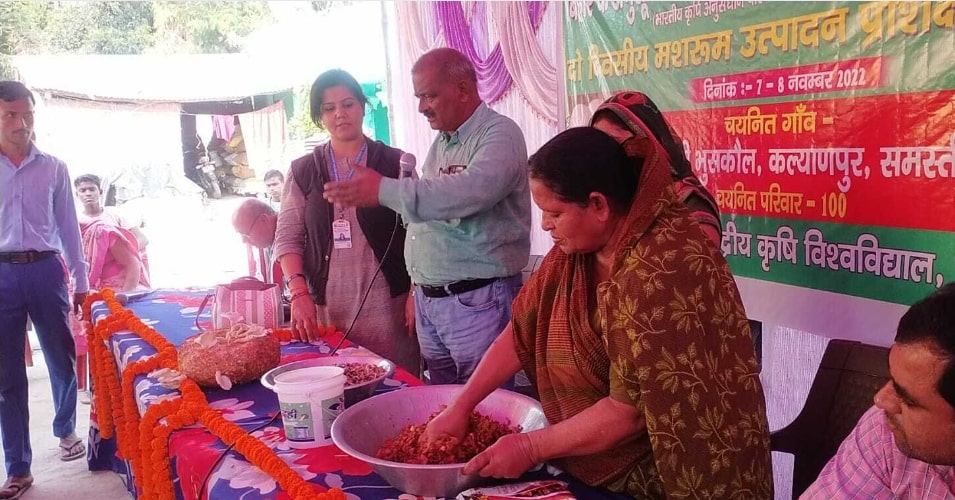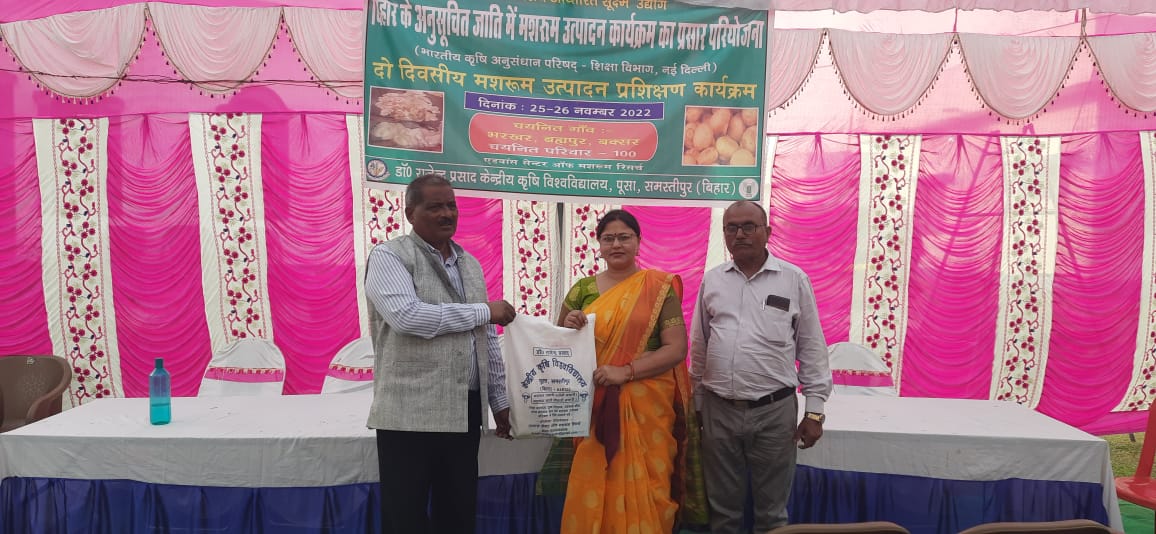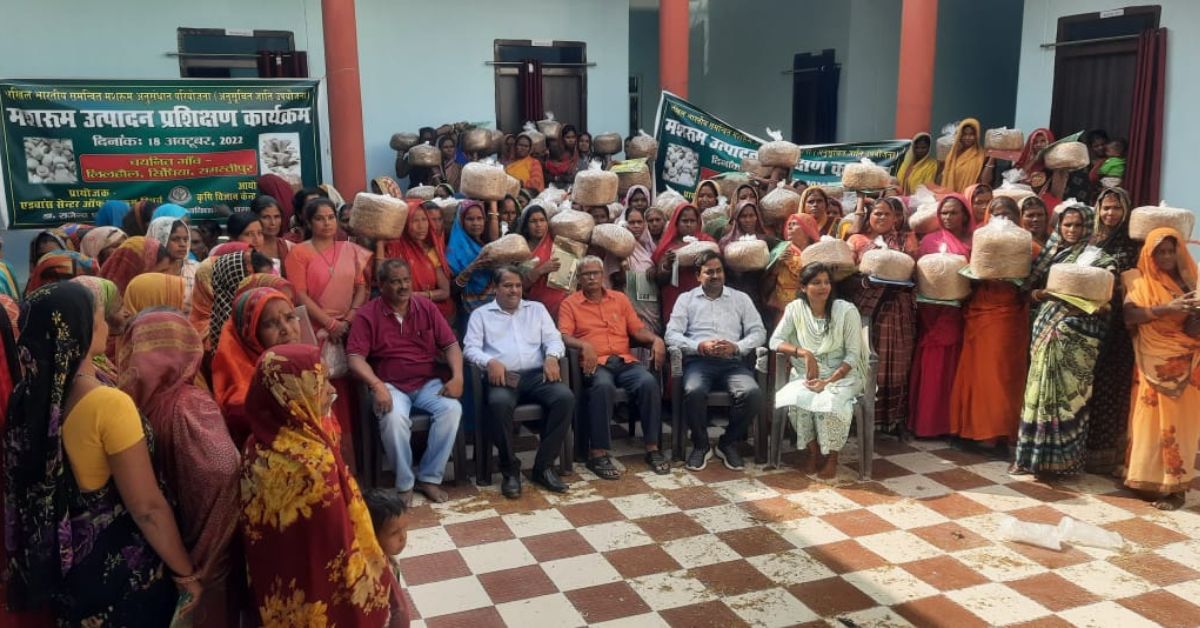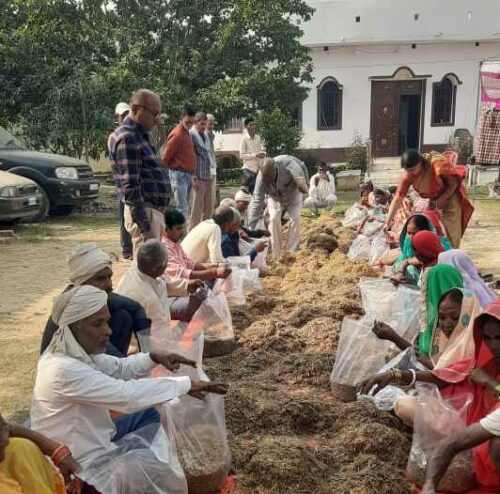2 Lakh Farmers, 28000 Tonnes Produced: Professor Helps Spur Bihar’s Mushroom Revolution
Scientist Dr Dayaram played an instrumental role in increasing Bihar’s mushroom cultivation, helping train lakhs in the occupation and producing thousands of tonnes over decades.

For Rekha Kumari, a homemaker and mother of two from Bihar’s Hathua town, stepping into farming and starting an entrepreneurial journey was life-changing.
For years, her hands had been full with taking care of her household and children. So when her children grew up and left for further education, she didn’t know how to use her time productively, she says. While looking for ideas, she stumbled upon the scope of mushroom cultivation in her state and decided to try her hands at it.
“The best part about mushroom farming is that I can be at home and make money. It is convenient for women like me who prefer to stay at home and do farming within our comforts,” says Rekha, who started her venture in 2013 with just Rs 1,000.
“Today, I earn around Rs 3 to 4 lakh a year. I have also been training people in mushroom cultivation and value addition,” she adds.
Currently, like Rekha, many other rural women in the state of Bihar are earning a steady income by growing mushrooms.

According to the data released by the National Horticulture Board, Bihar has become the largest mushroom-producing state in the country. With around 28,000 metric tonnes of mushrooms produced in the year 2021-2022, the state has accounted for around 10.82 per cent of the total mushroom production in the country.
But this wasn’t the situation in the eastern state a few decades ago. The mushroom revolution was brought here with decades-long expeditions and efforts.
Dr Dayaram, a scientist from the Dr Rajendra Prasad Central Agricultural University in Samastipur, played an important role in promoting mushroom cultivation in Bihar. Popularly known as the ‘mushroom man’, his efforts have been crucial in boosting mushroom cultivation in the state to the current level of success.
“When I started out my career as a scientist in Bihar, the situation in the state was different. It was economically weaker than it is today. After interacting with people, I realised that a majority were daily wagers who struggled to even find work every day. This made me think of a way in which they can be empowered, and I tried to do it within my capacity,” Dr Dayaram tells The Better India.
Spurring a mushroom revolution

In 1991, Dr Dayaram joined as an assistant professor and junior scientist in the Department of Plant Pathology at the Regional Research Station in Madhopur. Alongside senior colleague Dr VK Singh, he began his efforts in mushroom cultivation.
“We started with our focus on oyster mushrooms and researched its scope and potential. I also conducted free training programmes for people on oyster mushroom cultivation. Over the years, I was able to do my part in popularising mushroom farming in the state. Eventually, the state government also realised the potential of mushroom cultivation,” says Dr Dayaram, adding that back then, mushrooms were more attached to the concept of eradicating malnutrition.
In 1999, with the popularisation of mushroom cultivation, the state government was ready to give out funds for its development. “The government sanctioned around Rs 24 lakh for the development of mushroom cultivation,” he adds.
The following year, when Dr Dayaram was moved to the university headquarters, he started researching button mushroom cultivation.
“We slowly started researching more varieties of mushrooms. So far, we have developed technologies and procedures to cultivate around six varieties — namely oyster, button, milky, shiitake, hericium, and paddy straw. These technologies have helped increase the yield. We have also been doing a lot of groundwork in disseminating these technologies to people through training programmes and workshops,” says Dr Dayaram.
He also adds, “Around three years ago, Bihar was 13th in terms of mushroom production. Today, with our efforts, the state has topped with over two lakh mushroom farmers, among which the majority are women. It has become a better and more convenient source of income for them”
“Among the two lakh cultivators, there are around 123 control units that grow mushrooms round the year under controlled conditions. Their minimum production is 500kg per day and the maximum is around 10 tonnes per day. The rest are seasonal cultivators who do it in seasons or in a small way, whenever they have time,” he says.

A few years ago, when the production was amplified across the state, Dr Dayaram and his team came up with the idea of the value addition of mushrooms. “We initiated the concept of making value-added products out of mushrooms, thereby increasing the scope of its cultivation. We developed more than 50 products, among which 10 have been branded and are available locally,” he adds. These include mushroom powder, pickles, cookies, samosas, namkeen, and ladoos.
“We were able to develop the potential of mushroom in aspects like spawn production, compost production, round-the-year mushroom production, processing, packaging, product development, and marketing. The research has resulted in formulating spawn varieties that can be cultivated every season in Bihar, thereby helping farmers grow mushrooms throughout the year,” says Dr Dayaram.
The university now offers several training programmes and courses for people who are interested in mushroom cultivation.
“From a one-day training course to a year-long certificate course, we have a wide range of courses on growing different types of mushrooms. All the courses are paid, except for SC/ST candidates,” he adds.
Meanwhile, Rekha says, “I consider Dayaram ji my guru. I learnt all the aspects of mushroom cultivation under a training programme led by him. So, whenever I have a doubt, I call him right away to get his advice and suggestions. He has always been happy to help farmers like us.”
Understanding the real potential of the fungi, the government of Bihar has been widely promoting its cultivation and production across the state. “The state government is currently offering a 50 per cent subsidy for mushroom farmers. Around 28 tonnes of mushrooms were produced in 2021-22 and we are expecting around 35 tonnes in the upcoming year,” he says. If you found our stories insightful, informative, or even just enjoyable, we invite you to consider making a voluntary payment to support the work we do at The Better India. Your contribution helps us continue producing quality content that educates, inspires, and drives positive change. Choose one of the payment options below for your contribution- By paying for the stories you value, you directly contribute to sustaining our efforts focused on making a difference in the world. Together, let’s ensure that impactful stories continue to be told and shared, enriching lives and communities alike. Thank you for your support. Here are some frequently asked questions you might find helpful to know why you are contributing?

Edited by Divya Sethu; Photo credits: Dr Dayaram
This story made me
- 97
- 121
- 89
- 167














